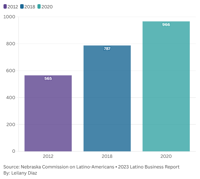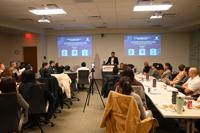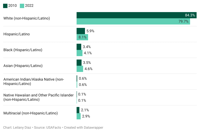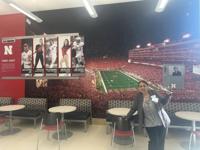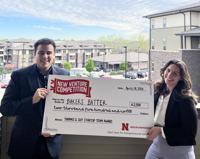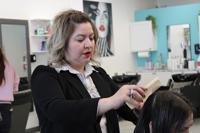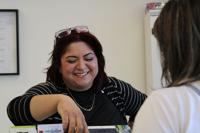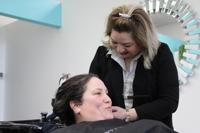This project features three stories that highlight the experiences of Hispanic entrepreneurs in Lincoln. This story explores community-led programs, personal resilience and cultural connection and highlights how Hispanic business owners are overcoming challenges, networking and growing their business. Each story is translated into Spanish. To access those, click here.
Number of Hispanic-Owned Businesses in Nebraska
The chart shows the increase in Hispanic-owned businesses in Nebraska. This information comes from the 2023 Latino Business Report.
Hispanic-owned businesses in Nebraska have increased over the years. The 2023 Latino Business Report shows that from 2012 to 2020, there was an increase of 401 Hispanic-owned businesses from 565 to 966.
Of these businesses, 66.1% are owned by men and 22.7% are owned by women. As of 2023, Hispanic people made up approximately 12.9% of Nebraska’s population, according to the U.S. Census Bureau.
However, despite their growth across Nebraska, the Hispanic business community recognizes challenges such as language barriers, lack of resources on knowledge about U.S. business systems and networking. Hispanic business leaders and owners in Lincoln are aiming to grow and maintain a stronger business community.
To address these challenges and strengthen support for Hispanic entrepreneurs in the capital city, the people behind community-led initiatives such as Latino Connect and the Latino Small Business Program are working to better serve their communities.
Latino Connect foster education and community for Hispanic business success
In 2022, Raul Sarmiento Jr., one of the three business leaders of Latino Connect, collaborated with a group of Hispanic business leaders and seven local entrepreneurs to advise the Lincoln Chamber of Commerce on strategies to better support and engage with their business community.
Sarmiento said that the committee created a survey for Hispanic business owners to contribute to sharing their perspectives on what they want to learn.
“We started really digging into how to support the businesses that were already here that really didn’t have access to the knowledge and how to run a business based on how the system runs,” Sarmiento said. “So, we came to the conclusion that we needed to develop something where people could obtain information about how to run their business here but in their own language.”

Latino Connect event where speaker Cristian Camacho from Growth Bizon LLC talks about digital marketing to local Hispanic entrepreneurs.
With 120 Hispanic entrepreneurs in Lincoln, the Latino Connect advisory committee finds it important to have launched a program that has culture sensitivity. Having an English speaker alongside a live Spanish translator, Sarmiento sees this approach not quite effective. Hispanic individuals who come to the U.S. encounter specific challenges to be able to understand how the business system works differently in this country.
“Having that culture sensitivity maybe didn’t happen before, and now that we have people that are so diverse but that specifically are immigrants it helps the Chamber to provide that,” Sarmiento said.
The two main challenges that the Latino Connect committee has identified are the lack of knowledge on how to run a business in the U.S. and networking. The program’s mission is to connect and create opportunities for Hispanic entrepreneurs and business owners in Lincoln, supplying education and cultivating connections necessary to boost business growth and success.
“We are their representation. The committee is their representation, but they are the voice,” Sarmiento said. “They provide feedback in their own language, we are asking them the questions and based on how they answer is how we are providing these opportunities.”

The Lincoln Chamber of Commerce announcing the new Latino Connect program on Monday, Nov. 18, 2024.
About 160 people had attended the announcement of the new Latino Connect program on November 2024. According to Sarmiento, this level of engagement shows the Hispanic and Latino Business Committee that there is a need for support, and they are in a position to provide it.
“It excites me that there are that many, because the community is diverse and again, we can all learn from each other and uplift Lincoln and Nebraska,” Sarmiento said.
To help ensure access to all, Jason Ball, president and CEO of the Lincoln Chamber of Commerce, noted that the committee’s primary need for programming in Spanish language. Real-time translation tools were offered at the last two networking events.
“Sometimes talking about business themes, there is technical language that goes along with how to read a P&L sheet or what businesses insurance practices need to look like,” Ball said. “Because of that, the language had really become I think a barrier to some parts of the Hispanic and Latino community, certainly not everybody in that community.”
Racial makeup of Lancaster County: Predominantly white but with increase in the Hispanic population

The graph compares the racial composition of Lancaster County between 2010 and 2022, showing a decline in the White population and an increase in the Hispanic population.
“This is a large and growing demographic group. It’s shaping Lincoln’s present right now and is going to be so involved in shaping Lincoln’s future,” Ball said.
According to Ball, he finds it important for the chamber to continue listening and understanding the perspectives of Hispanic business community for the growth of Lincoln’s economy. He emphasizes the importance of supporting Hispanic entrepreneurs in building their dream business.
“I really haven’t found where Hispanic and Latino-owned business owners are really operating in a different environment. I think it’s sometimes the language maybe less so cultural challenges come up, and it’s just meeting people where they are at,” Ball said.
Latino Small Business Program and UNL Extension making connections
Launched in 2015, the Latino Small Business Program, led by Sandra Barrera Fuentes, statewide Hispanic engagement coordinator for Rural Prosperity Nebraska in the UNL Extension, is another approach to empower Hispanic immigrant entrepreneurs in Nebraska to start their own business.
As a Colombian immigrant and entrepreneur, Fuentes launched the program on account of the Rural Prosperity Nebraska, as they find it necessary to help grow small local rural areas in Nebraska of entrepreneurs.
The program’s initiatives are providing native-language business education, entrepreneurship counseling and networking opportunities.

Sandra Fuentes in the UNL College of Business celebrating the 20 years of service at UNL Extension in April 1, 2025.
Having 10 years of running the program, Fuentes worked directly with 934 business, contributing to the growth of around 1,000 Hispanic-owned startups. Despite that, she notes a lack of support between Hispanic business owners in Nebraska.
“I don’t see Latinos going out to help businesses, so we need more accountants, and we need more people in tax marketing who speak the same language,” Fuentes said.
The Latino Small Business Conference, which takes place four times a year in various parts of Nebraska, brings together entrepreneurs and business owners to educate and connect with professional, suppliers and vendors from a variety of career fields.

Sandra Fuentes and Latina business owners in the 2024 Latino Small Business Conference.
“The conferences cover topics that are important to businesses. For example, this year it’s in August and the theme is about preparation,” Fuentes said. “Prepare for what happens if I die, what happens if I get sick, what happens if I’m deported. What do I do with my business?”
What began 10 years ago with zero Spanish-speaking marketing accountants has grown into a team of seven today. Fuentes still faces difficulties of finding white American business professionals who are willing to collaborate and help Hispanic entrepreneurs at conferences, particularly with bookkeeping and marketing.
“They don’t want to get involved with the translation and they still see us as very small,” Fuentes said. “Until now, they see us as big, they are seeing that Latino businesses are growing.”
Fuentes sees these collaborations as an opportunity to open doors not only for Hispanic entrepreneurs but for non-Hispanic business professionals.
“That’s why I hold conferences. I can demonstrate how many entrepreneurs we are. And if someone in marketing tells me, ‘No, I don’t speak Spanish, so I’m not going,’ and I say they’re losing a thousand clients, they’re losing the opportunity to grow too. You grow with us,” Fuentes said.
Hispanic Entrepreneurs in Lincoln
William Llanos shares how supportive and helpful Lincoln organizations and other departments have been with him throughout the process of opening his new Peruvian restaurant.
Starting a new restaurant is no easy task, especially when pursuing your ambition far from home and figuring out new processes. William Llanos, a Peruvian entrepreneur, is preparing to open his new restaurant The Golden Chickens, but faces hurdles. Financial obstacles are Llanos’s biggest challenge especially when navigating in building a fresh business in a new city. But with community support his desires to share his culture can be accomplished.
The Golden Chickens will serve Lincoln locals pollo a la brasa, a charcoal rotisserie chicken dish from Peru. Llanos is no stranger to building businesses as his father, who is an entrepreneur, had taught him how to run a business at an early age, as well as his two previous restaurants in Virginia.
Llanos initially visited Nebraska about eight to 10 years ago to see a friend. That visit ended up being a chance to create a restaurant that embraces Peruvian food and culture after noticing a need in the city’s gastronomy.

William Llanos stands next to his new resturants logo.
With design features like Nebraska’s signature “N” and artistic references to Peru’s historic Nazca Lines, the restaurant, which is scheduled to open soon, will showcase what Llanos refers to as a “Peru-Nebraska” theme, blending local and cultural pride.

The Golden Chickens front counter design idea.
However, there have been challenges along the way. Tight budgets and self-doubt are inevitable aspects of starting a small business, according to Llanos. He has turned to local Hispanic company owners and groups like the Lincoln Chamber of Commerce for advice and contacts to overcome them.
“Friends have helped me with an investment or a low-interest loan because the bank’s interest rate is 7.5% or higher,” Llanos said. “But when someone has a reputation and knows they have financial backing and knows and has experience with the restaurant, the percentage is much lower with the people you know.”

Front page of The Golden Chickens restaurant’s blueprint.
Llanos recognizes that Hispanic business owners need to be affiliated with the community because they are not alone. He says that by staying educated, having a firm mindset on your business goals, and collaborating with other entrepreneurs or leaders such as those in Latino Connect, anyone can successfully reach their goals.
“Above all, it’s about helping people. I mean it’s not just about doing business and saying ‘I’ll make money.’ No, it’s about helping the people on your side in every little detail that you’re going to do with the business,” Llanos said.
Carlos Ferrer discusses on the challenges Hispanic-owned businesses face with digital marketing compared to American businesses.
Carlos Ferrer, a Costa Rican–born immigrant studying at the University of Nebraska-Lincoln, immigrated to the U.S. in 2011, where he was raised in Grand Island.
Growing up as an immigrant kid, Ferrer had to assimilate a new culture and put down his own culture. At age 9, language barriers were a challenge for his parents in which he needed to translate bank or medical information to them, maturing him at a young age. However, translating for his parents has helped Ferrer now to do it for a broader audience.

Carlos Ferrer and Cheyenne Prentice holding a winner cheque of $2,500 from the New Venture Competition in April 2024.
Before Ferrer developed his marketing agency, while taking entrepreneurship courses at University of Nebraska-Lincoln, he developed a passion for video production and felt determined to create something with it.
“I believe that everybody should do something while they are in college. The biggest thing is meet people, and then those connections will take you way farther than I ever thought that it could be,” Ferrer said. “I had no plan to start any of this literally two years ago, so it’s crazy how things progress and its exciting for the future.”
Ferrer has always wanted to create a business, however, he did not have an idea of what kind of business he wanted. Until March 2024, his roommate’s neighbor’s dad had owned a media production company, which led him to launch his marketing agency.
Being the first in his family to become an entrepreneur, Ferrer’s marketing agency called Speakeasy Visuals, is a bilingual full-service Spanish speaking business. He aims to help any Hispanic businesses in Nebraska that need to grow their business through marketing from Spanish to English and vice versa.
“The Latino community needs help digitizing and speeding up their growth,” Ferrer said.
When Ferrer visited one of the Latino Connect events, he had the opportunity to meet other Hispanic entrepreneurs in similar passions and situations like him. As the Hispanic business community in Lincoln were not united enough before, Ferrer finds these connections useful for Hispanic entrepreneurs.
“Come to find out there is like a dude who has a marketing agency in Columbus, and then there is a dude who does video production in Omaha. And so I’ve met these people and I can use them as resources,” Ferrer said.
Being a business major, Ferrer has learned through American customs how important networking is. However, he recognizes how uncommon Hispanic immigrant entrepreneurs’ network and understands where those struggles come from.
“There are a few practices in Latino communities that aren’t being done that are being done in American customs, so networking,” Ferrer said. “That is something that I needed to take from American culture and really valued it. That’s been the biggest thing that has helped me at all to start anything.”
According to Ferrer, his resources come from his business classes and hands-on experience. He finds it important to leverage his knowledge in business marketing and make use of it to help other Hispanic entrepreneurs whether it’s connecting them with others or teaching them about marketing strategies.
Alba Florian emphasizes the importance of unity and mutual support within the Hispanic business community in Lincoln.
With unwavering determination in building her dream business in the U.S., Alba Florian, founder of Robersy’s Beauty Salon, was born and raised in Guatemala. She had studied cosmetology in Guatemala, however, with her situation in her home country she decided to immigrate to the U.S. approximately 18 years ago.
“It was very difficult with everything because I did not know people. I did not know how to start hair because I did not know the products here. They are different from over there, and the language was difficult for me too,” Florian said. “But my dream was always that I wanted to be a hairstylist and in my mind there was always nothing else to think about but studying and practicing that profession.”

Alba Florian is getting started with cutting one of her client’s hair after shampooing and conditioning.
Florian started out working at a restaurant while serving different people in small hair services at home, as shedid not have a business during that time. It took her seven years to meet and receive new people even if she was not able to provide a full service.
“They were people who filled my heart because they understood. They understood that I wasn’t at that level, and with them, I began to discover products that I thought I could work with,” Florian said. “But in those seven years something also came to my mind and I said, ‘But if I can do something different than what I’m doing,’ I mean, what I’m doing is really hard.”
While providing small hair services, Florian was figuring out how to be a licensed cosmetologist in Nebraska. She had to take an English cosmetology exam but was only given six tries.
“The truth is I passed the sixth time and till this day, since my daughter studied cosmetology in this country and she realized that I passed with three more questions,” Florian said. “I did not know I was going to pass with 63 questions—I mean, the minimum was 60, but imagine that. And what I call it in my country ‘raspadita,’ but I did not care, all I wanted was to pass.”

Robersy Florian smiling as she is helping a client pay for her haircut.
Florian’s beauty salon business started out on O Street and met many new clients. She then transferred her business to North 27th Street and after some time Florian was not able to continue and took a pause on her business. During that break, her daughter Robersy Florian wanted to open up a beauty salon business with her mom and changed her previous major to study cosmetology in college. Her current business Robersy’s Beauty Salon is named after her daughter.
“I told her, ‘Okay, now is the time to reopen,’ and that is when we opened this business together. And for me, it was so wonderful that I can’t explain it,” Florian said.
Robersy’s Beauty Salon being one of the seven business owners’ part of the Hispanic and Latino Business Committee in Latino Connect, Florian finds it important to represent as one of the Latina business owners in the program’s business committee.
“It’s something I never expected, neither could I tell women to lower their desire to do it, I never would. I would always tell them to do it, to try,” Florian said.

Alba Florian smiles at her client as she is drying her hair with a towel after shampooing and conditioning.
Throughout Florian’s business journey, she was challenged by finding people and resources to help her become a business owner. When encountering other Hispanic entrepreneurs aspiring to own their own business motivates her to help them as much as she can.
“There are people who come to us and say, ‘Hey Albita, how can I start this to do for the other?’ They are people who have that dream,” Florian said. “We’ve met a lot of people who have supported us because we’ve also learned. And there we go, passing on the information, spreading the word.”


